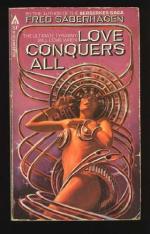“SO THAT’S YOUR REVENGE.... BUT YOU’RE TO RECKON WITH ME, JACK BELLLOUNDS! YOU VILLAIN! YOU DEVIL! YOU”—
It would be unfair to the millions of readers who will struggle for possession of the circulating-library copies of “The Mysterious Rider” to tell just what happens after this. But need we hesitate to divulge that the final subtitle will be:
“‘I HAVE FAITH AND HOPE AND LOVE, FOR I AM HIS DAUGHTER.’ A FAINT, COOL BREEZE STRAYED THROUGH THE ASPENS, RUSTLING THE LEAVES WHISPERINGLY, AND THE SLENDER COLUMBINES, GLEAMING PALE IN THE TWILIGHT LIFTED THEIR SWEET FACES.” (Decorative bull.)
XLIV
SUPPRESSING “JURGEN”
Of course it was silly to suppress “Jurgen.” That goes without saying. But it seems equally silly, because of its being suppressed, to hail it as high art. It is simply Mr. James Branch Cabell’s quaint way of telling a raw story and it isn’t particularly his own way, either. Personally, I like the modern method much better.
“Jurgen” is a frank imitation of the old-time pornographers and although it is a very good imitation, it need not rank Mr. Cabell any higher than the maker of a plaster-of-paris copy of some Boeotian sculptural oddity.
The author, in defense of his fortunate book, lifts his eyebrows and says, “Honi soit.” He claims, and quite rightly, that everything he has written has at least one decent meaning, and that anyone who reads anything indecent into it automatically convicts himself of being in a pathological condition. The question is, if Mr. Cabell had been convinced beforehand that nowhere in all this broad land would there be anyone who would read another meaning into his lily-white words, would he ever have bothered to write the book at all?
Mr. Cabell is admittedly a genealogist. He is an earnest student of the literature of past centuries. He has become so steeped in the phrases and literary mannerisms of the middle and upper-middle ages that, even in his book of modern essays “Beyond Life,” he is constantly emitting strange words which were last used by the correspondents who covered the crusades. No man has to be as artificially obsolete as Mr. Cabell is. He likes to be.
In “Jurgen” he has simply let himself go. There is no pretense of writing like a modern. There is no pretense of writing in the style of even James Branch Cabell. It is frankly “in the manner of” those ancient authors whose works are sold surreptitiously to college students by gentlemen who whisper their selling-talk behind a line of red sample bindings. And it is not in the manner of Rabelais, although Rabelais’s name has been frequently used in describing “Jurgen.” Rabelais seldom hid his thought behind two meanings. There was only one meaning, and you could take it or leave it. And Rabelais would never have said “Honi soit” by way of defense.
The general effect is one of Fielding or Sterne telling the story of Sir Gawain and the Green Knight, with their own embellishments, to the boys at the club.




